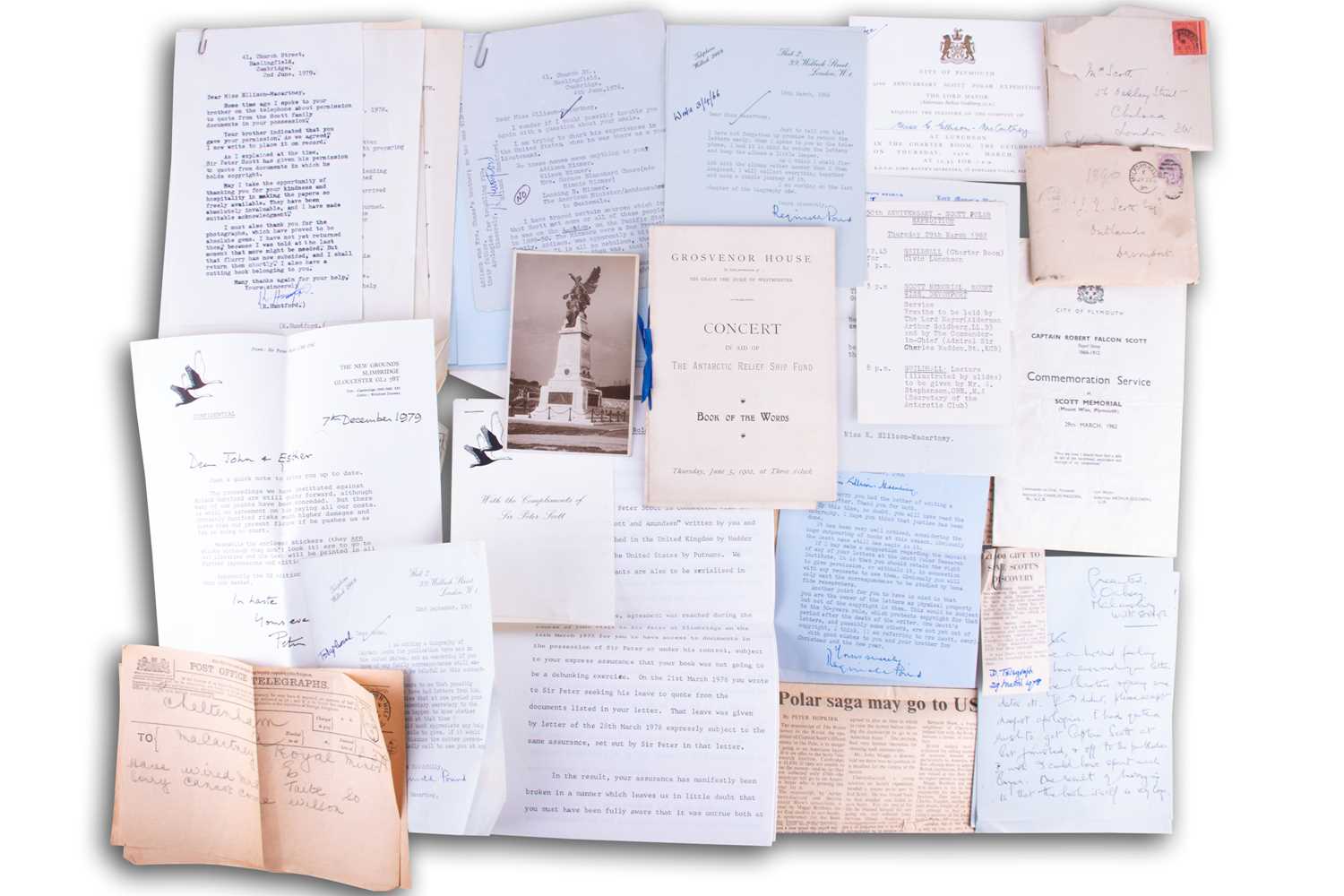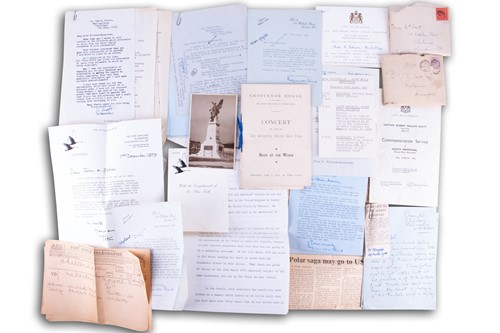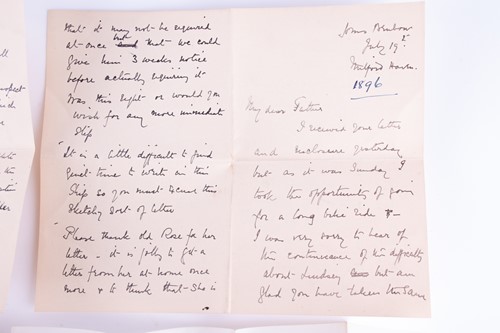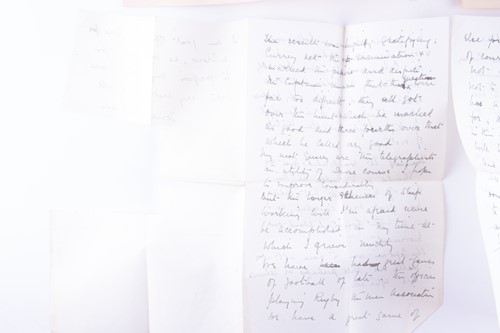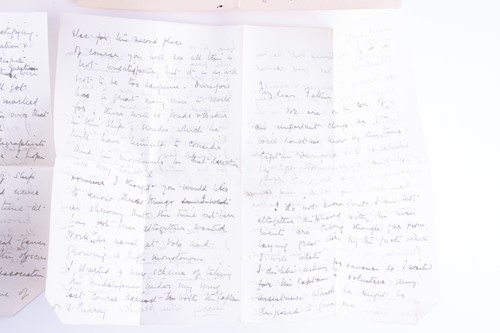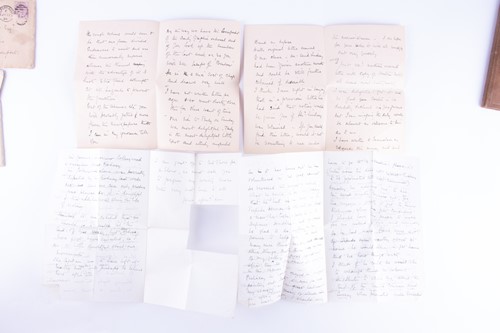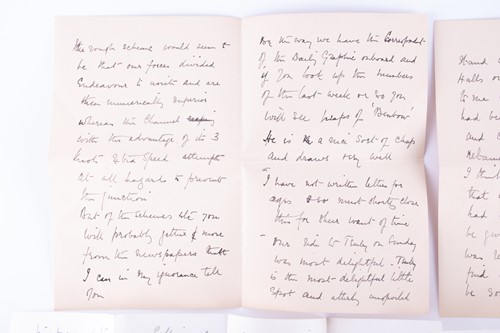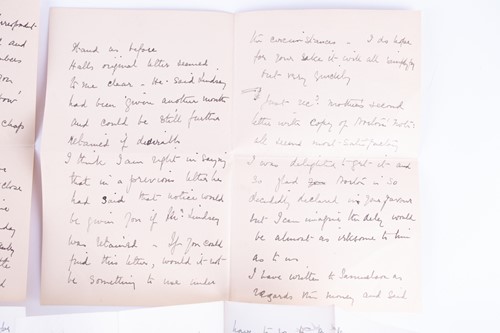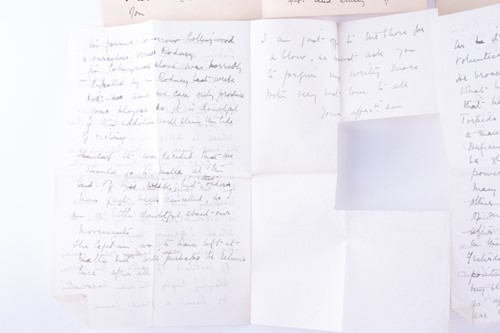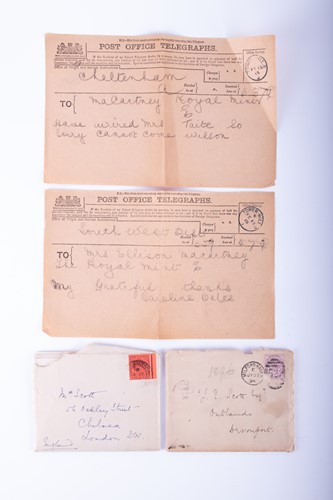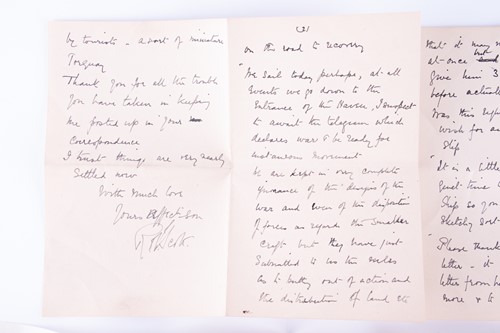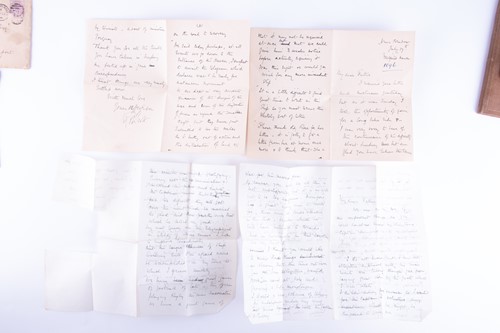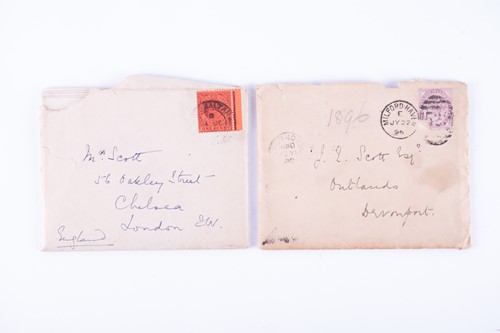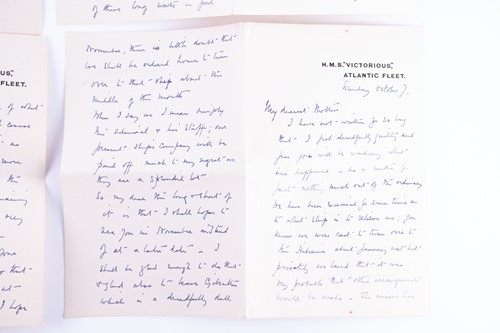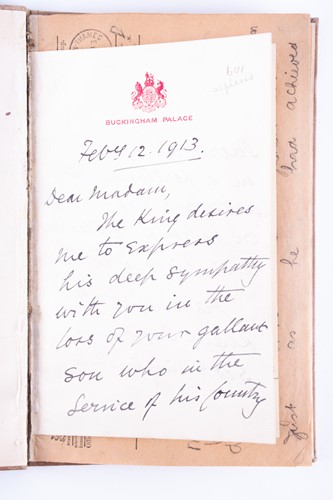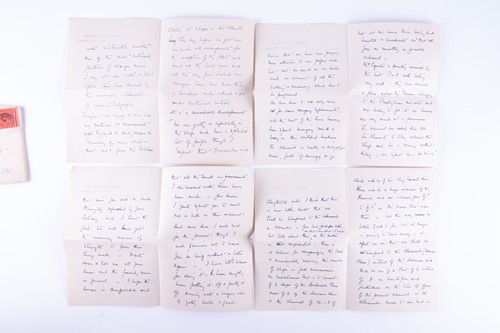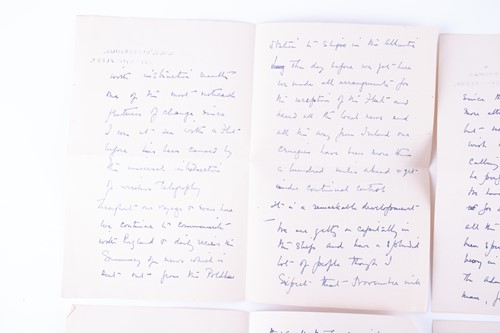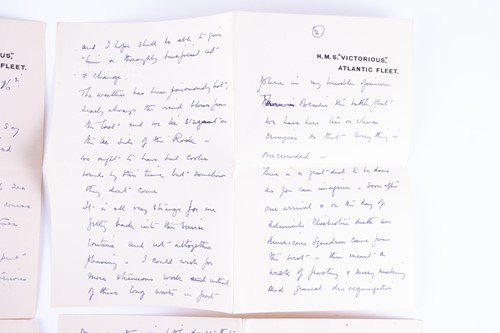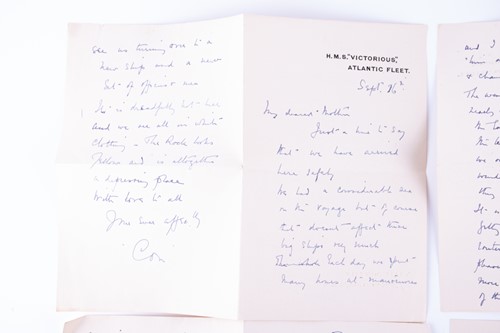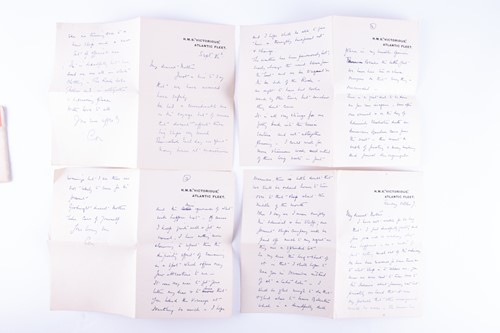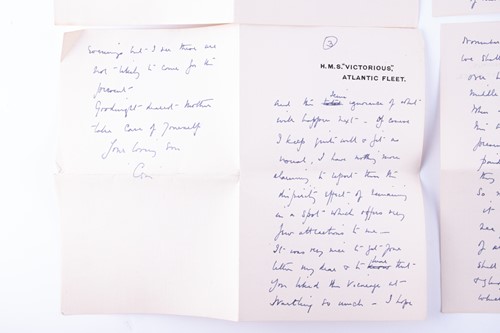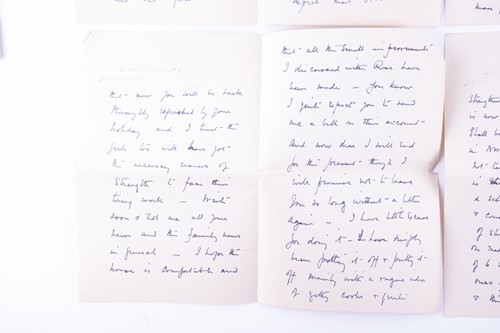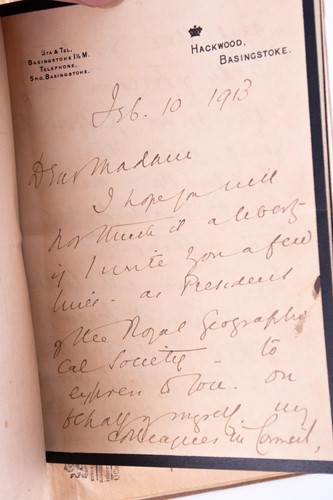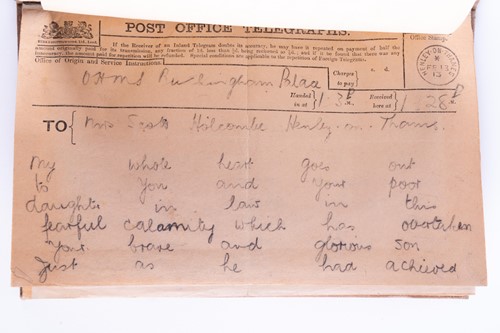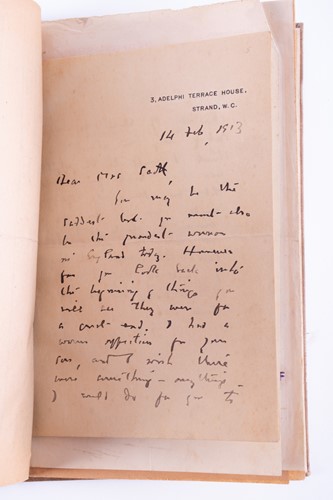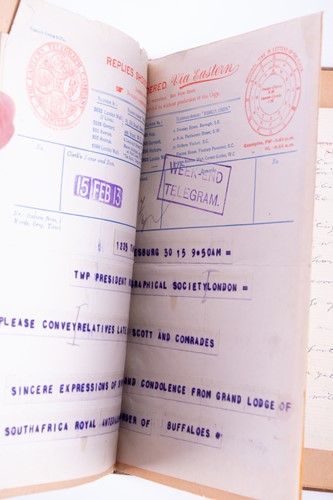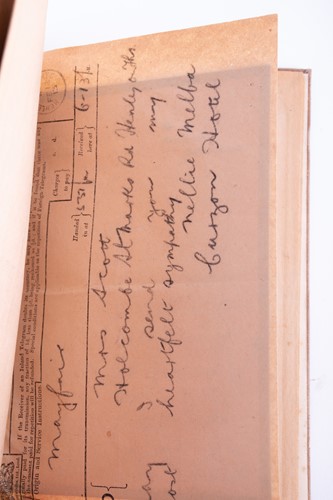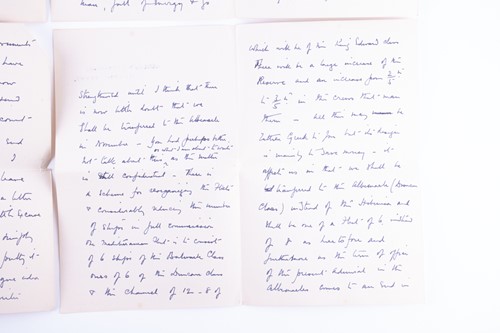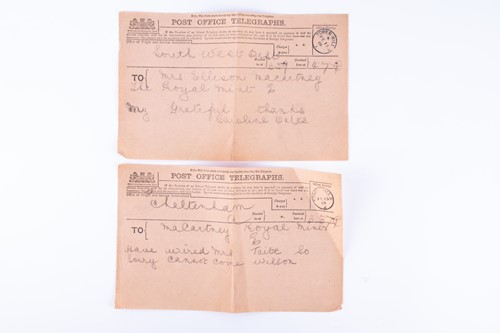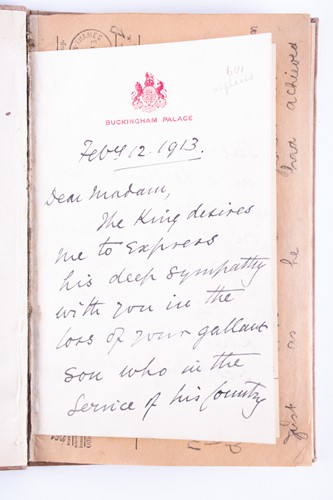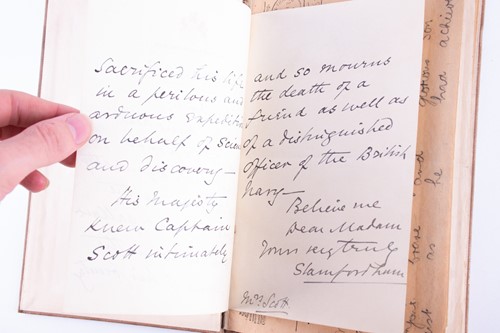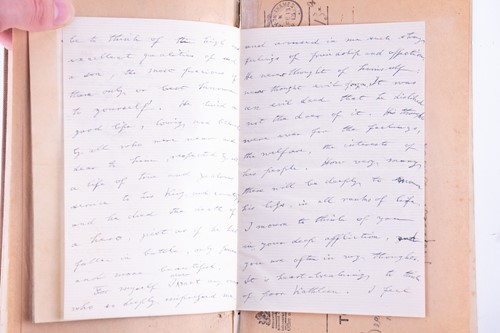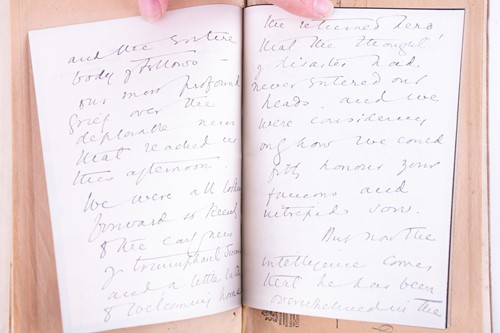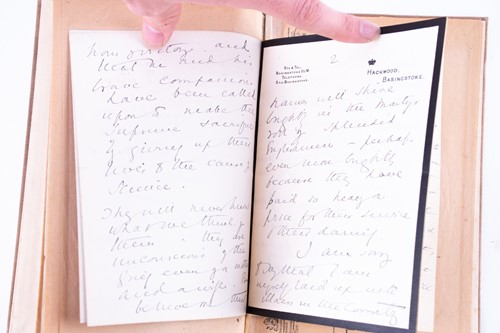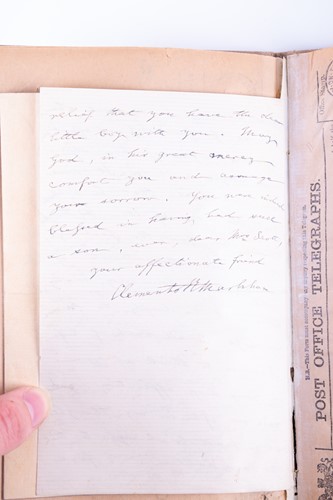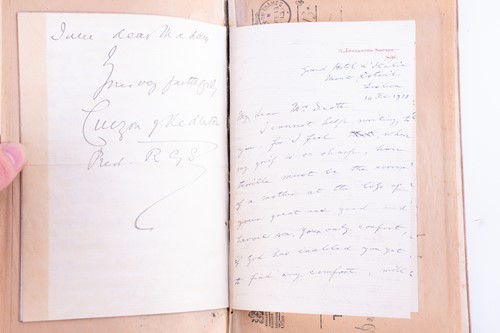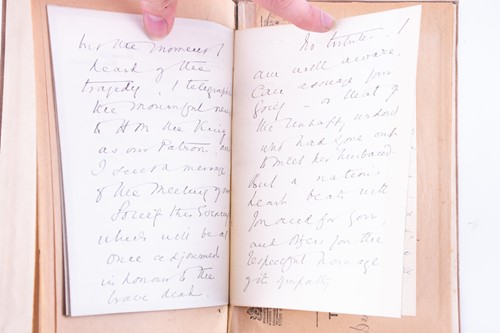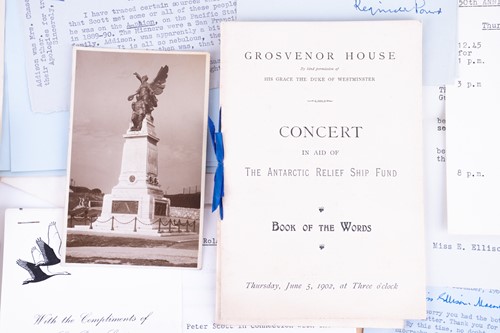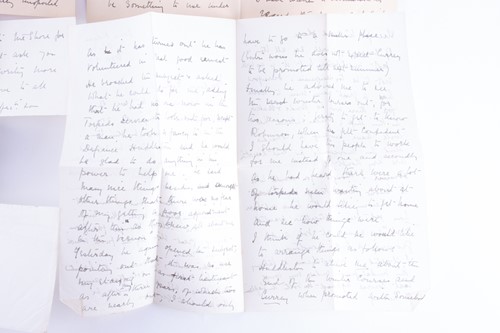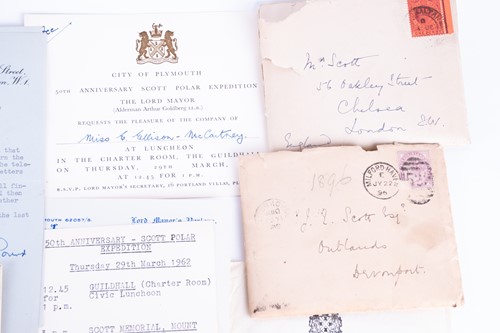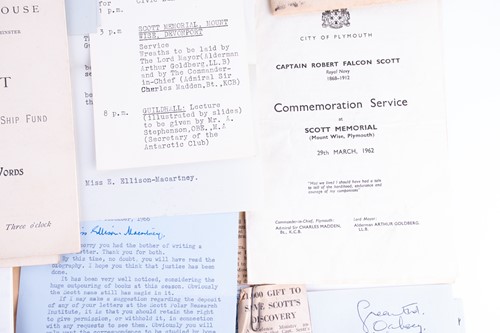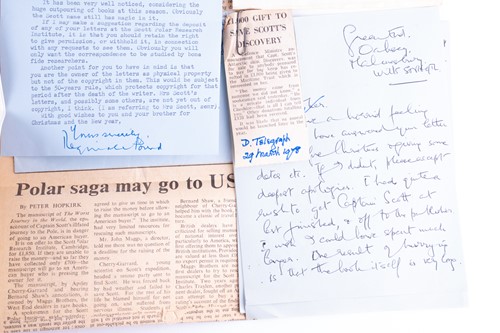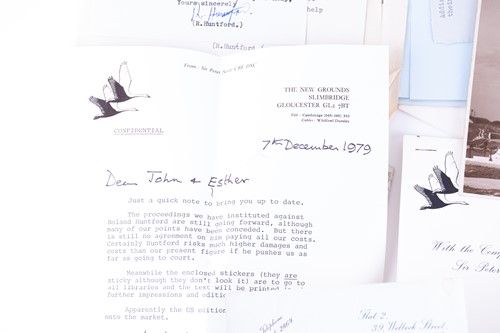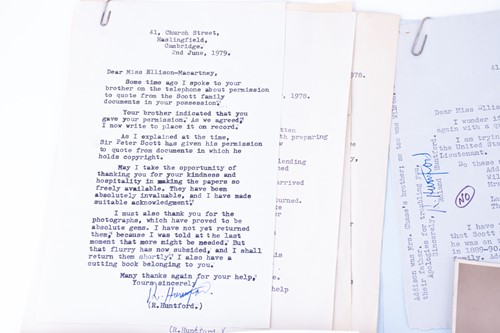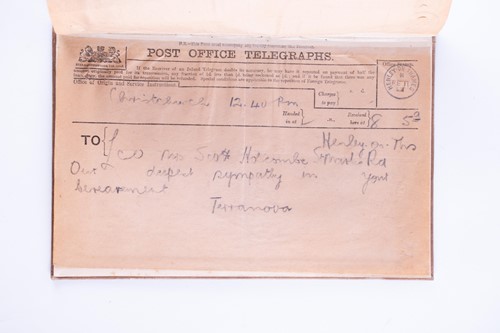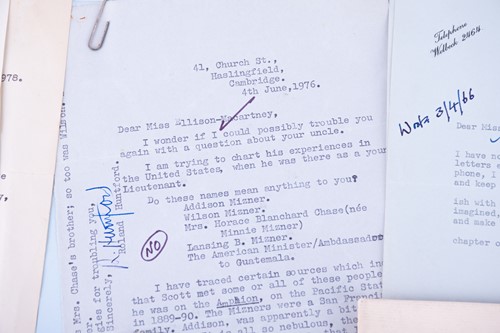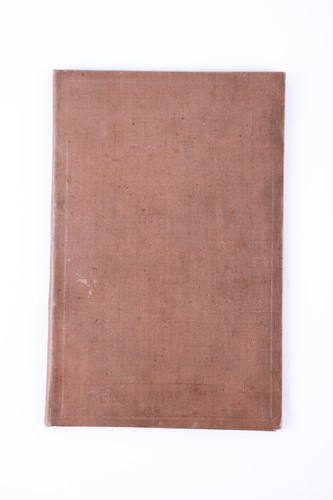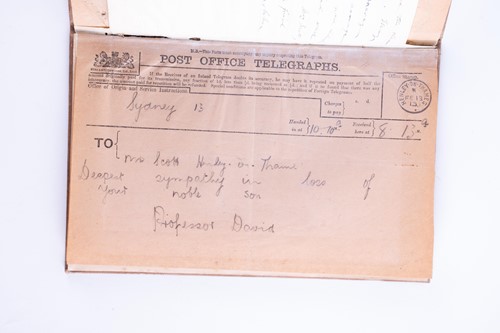27th Aug, 2020 9:30
Robert Falcon Scott CVO (1868-1913): A large and comprehensive archive of ephemera from, and relating to Captain Scott. Spanning almost a century, the collection comprises: four handwritten letters from Scott to his parents, (two to his father circa 1896, and two to his mother in 1906), a bound set of condolence letters and telegrams to his mother after his death (from Buckingham Palace, his close friend J.M. Barrie, a telegram from Queen Alexandra of Denmark, a letter from George Curzon, [1st Marquess Curzon of Kedleston, President of the Royal Geographical Society between 1911 – 1914], various telegrams from Geographical Societies and friends, and a poignant letter from Scott’s long-term mentor and sponsor, Sir Clements Markham), and later family correspondence.
Having been held by the descendants of Scott's sister, Ettie Myers Scott and her husband Sir William Grey Ellison-Macartney (1852-1924), the collection contains many written and typed letters relating to Scott, largely to and from authors of biographies, namely Reginald Pound, Elspeth Huxley and Roland Huntford. Also present are letters from the Scott Polar Research Institute, discussing the viewing, donation and loaning of family archive material relating to Captain Scott, original programmes from memorial events and four original pages of headed notepaper from the 1901 Discovery Expedition (unused). Perhaps the most intriguing items in this later collection relate to the legal dispute that the family had with Roland Huntford, author of 'Scott and Amundsen', published in 1979, which depicted Captain Scott as a 'heroic bungler' rather than a British national hero. There is a letter here from Scott's only child, Sir Peter Markham Scott (1909-1989), to Esther Ellison-Macartney (Robert Scott's niece), pointing out his displeasure with the final book, as well as a copy of a draft letter to Huntford, from Sir Peter's solicitors, requesting changes to the book and the removal of a serialisation in the Observer newspaper, based on inaccuracies and potential defamation.
The 1913 collection of condolences, received and kept by Kathleen Scott, includes a hand-signed letter from Arthur Bigge, 1st Baron of Stamfordham, who had served as private secretary to Queen Victoria, Edward VII and at this time, to George V, who said ‘His Majesty knew Captain Scott intimately and so mourns the death of a friend as well as of a distinguished officer of the British Navy.’ Sir Clements Markham, who had publicly championed Scott for many years, paid the following tribute in his letter: ‘I feel when my grief is so sharp, how terrible must be the sorrow of a mother at the loss of your great and good and heroic son. Your only comfort, if God has enabled you yet to find any comfort, will be to think of the high and excellent qualities of such a son, the most precious of them only or best known to yourself. He lived a good life, loving and beloved by all who were near and dear to him, respected by all, a life of true and zealous service to his King and country, and he died the death of a hero.’ J.M. Barrie, author of Peter Pan and a close friend of Scott (Scott’s son was named after the book’s main character), wrote ‘I had a warm affection for your son, and I wish there were something – anything – I could do for you to show it.'
The letters from Robert Scott to his father largely relate to his activities at the time as a torpedo officer aboard HMS Vulcan, discussing life on board, their work and even the personalities and career progression of various officers. The later letters to his mother, falling in between his two Antarctic expeditions and after his promotion to Captain, written on HMS Victorious headed paper, cover similar themes, with often candid descriptions of changes being made to the Atlantic Fleet as well details of personnel changes. One passage relating to being relieved by another crew states: 'I shall be glad enough to do this and should also to leave Gibraltar which is a dreadfully dull place in my humble opinion'. He signs these 1906 letters 'Con', an abbreviation of his middle name Falcon, by which he was known to his immediate family.
Provenance: Discovered as part of a recent London house clearance, along with other items relating to the Macartney family. Most of the later items are addressed to Esther Ellison-Macartney, Scott's niece and the collection had been retained by her descendants.
Sold for £8,500
Condition Report
The Scott letters are all in good overall condition, with original envelopes, with general wear commensurate with age. Some fading to writing in places, and Scotts' signature has been cut out from one of the letters to his father (reason unknown). All other items in fair condition, with some wear commensurate with age.
Robert Falcon Scott CVO (1868-1913): A large and comprehensive archive of ephemera from, and relating to Captain Scott. Spanning almost a century, the collection comprises: four handwritten letters from Scott to his parents, (two to his father circa 1896, and two to his mother in 1906), a bound set of condolence letters and telegrams to his mother after his death (from Buckingham Palace, his close friend J.M. Barrie, a telegram from Queen Alexandra of Denmark, a letter from George Curzon, [1st Marquess Curzon of Kedleston, President of the Royal Geographical Society between 1911 – 1914], various telegrams from Geographical Societies and friends, and a poignant letter from Scott’s long-term mentor and sponsor, Sir Clements Markham), and later family correspondence.
Having been held by the descendants of Scott's sister, Ettie Myers Scott and her husband Sir William Grey Ellison-Macartney (1852-1924), the collection contains many written and typed letters relating to Scott, largely to and from authors of biographies, namely Reginald Pound, Elspeth Huxley and Roland Huntford. Also present are letters from the Scott Polar Research Institute, discussing the viewing, donation and loaning of family archive material relating to Captain Scott, original programmes from memorial events and four original pages of headed notepaper from the 1901 Discovery Expedition (unused). Perhaps the most intriguing items in this later collection relate to the legal dispute that the family had with Roland Huntford, author of 'Scott and Amundsen', published in 1979, which depicted Captain Scott as a 'heroic bungler' rather than a British national hero. There is a letter here from Scott's only child, Sir Peter Markham Scott (1909-1989), to Esther Ellison-Macartney (Robert Scott's niece), pointing out his displeasure with the final book, as well as a copy of a draft letter to Huntford, from Sir Peter's solicitors, requesting changes to the book and the removal of a serialisation in the Observer newspaper, based on inaccuracies and potential defamation.
The 1913 collection of condolences, received and kept by Kathleen Scott, includes a hand-signed letter from Arthur Bigge, 1st Baron of Stamfordham, who had served as private secretary to Queen Victoria, Edward VII and at this time, to George V, who said ‘His Majesty knew Captain Scott intimately and so mourns the death of a friend as well as of a distinguished officer of the British Navy.’ Sir Clements Markham, who had publicly championed Scott for many years, paid the following tribute in his letter: ‘I feel when my grief is so sharp, how terrible must be the sorrow of a mother at the loss of your great and good and heroic son. Your only comfort, if God has enabled you yet to find any comfort, will be to think of the high and excellent qualities of such a son, the most precious of them only or best known to yourself. He lived a good life, loving and beloved by all who were near and dear to him, respected by all, a life of true and zealous service to his King and country, and he died the death of a hero.’ J.M. Barrie, author of Peter Pan and a close friend of Scott (Scott’s son was named after the book’s main character), wrote ‘I had a warm affection for your son, and I wish there were something – anything – I could do for you to show it.'
The letters from Robert Scott to his father largely relate to his activities at the time as a torpedo officer aboard HMS Vulcan, discussing life on board, their work and even the personalities and career progression of various officers. The later letters to his mother, falling in between his two Antarctic expeditions and after his promotion to Captain, written on HMS Victorious headed paper, cover similar themes, with often candid descriptions of changes being made to the Atlantic Fleet as well details of personnel changes. One passage relating to being relieved by another crew states: 'I shall be glad enough to do this and should also to leave Gibraltar which is a dreadfully dull place in my humble opinion'. He signs these 1906 letters 'Con', an abbreviation of his middle name Falcon, by which he was known to his immediate family.
